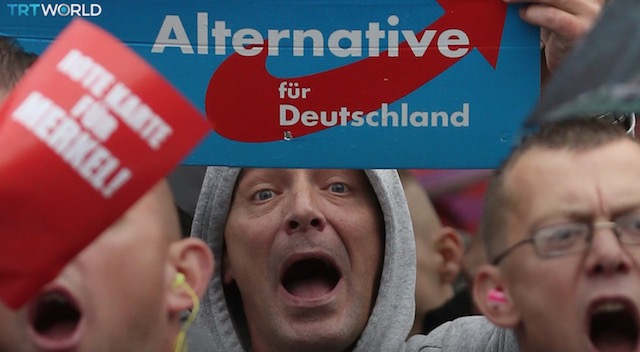
“You only are free when you realize you belong no place—you belong every place—no place at all.” ~ Maya Angelou
~
This quote on true belonging left me sleepless all night.
Not only because I, like many others, want to feel like I belong in my life, but also because Germany’s election results are in alignment with a scary development: a political leap to the far-right.
I am a German, and my country voted the Alternative for Germany, AfD, into our Parliament as the third-largest party. While a far-right party hasn’t been part of our Parliament since the 1950s, we’re not the only country shifting toward more nationalism.
While I’m writing from the perspective of a German citizen, this goes for most Western countries facing increasing immigration. Still shocked by the election result and feeling especially sensitive to the subject due to my nation’s history, I want to try to answer the obvious question: why?
“Research shows when people feel a loss of control, they seek a stronger connection to group identity and experience a desire to make their group more powerful.” ~ Professor Immo Fritsche, University of Leipzig, Germany
The refugee crises can be considered a “loss of control” from the perspective of a citizen. We don’t know who is coming, how many people exactly are coming, or what the culture of these people is really like. That’s understandable uncertainty for everyone. I’m assuming many of us haven’t been to Muslim-majority countries; therefore our ideas of their culture and religion are limited to what we see online or on TV. This makes us more vulnerable to believing false claims and fake news about these people. Still, some of us decided to face the challenges with a positive attitude, while others decided to form a social or political protest against the foreigners.
Courage over Comfort.
Researcher Brené Brown’s mantra “courage over comfort” comes into play here. I feel a sense of belonging to this country, yet I am also capable of feeling ashamed for our history. Anytime I visit Berlin, or a concentration camp elsewhere, I choose courage over comfort. I know I’m not guilty of the crimes committed during the Nazi era, but I can take on responsibility. I don’t feel good talking about the harrowing things that happened, but speaking up and facing our history is more important to me than seeking peace in constant pleasure.
Increasing anxiety over identity and social change.
When rightist parties and their voters call for more nationalism, saying things like “America first” or “Germans shouldn’t be ashamed of their past anymore,” it seems like there are only two options: you’re either a proud citizen of your country and therefore you want to protect its borders, or you are ashamed of your nation’s history and want to make up for it.
The catch is: we can be both. The problem with that is whenever I’m “both,” I don’t draw a harsh enough line between the two groups to belong to one of them. I cannot connect with my fellow anxious citizens this way. But if I’m not willing to spread hate against the far-right, I don’t fully belong to the left either, it seems. Again this comes back to courage—the courage to possibly stand alone in the midst of a crisis.
“When leftists and liberals feel threatened, they too become more likely to close ranks with their own group and become more vehemently opposed to those who do not share their values, such as far-right parties and their supporters.” ~ Amanda Taub, New York Times
The comfort of belonging to a group is one thing—it’s another to then take a stand against other groups. The words “vehemently opposed” are describing the situation in many nations shockingly well. Liberals and leftists aren’t free from guilt when it comes to seeking comfort. We’re living in times where it’s not so much about what we stand for, but who we stand against.
Two sides of the same coin?
The far-right takes a stand against refugees; the left/liberals take a stand against the far-right. Within that scheme, our language becomes more disrespectful; our discussions are more heated and driven by emotion rather than facts. It seems almost as if our need for a group identity has grown so big, we’d do anything to underline our belonging to that group. Don’t get me wrong, I think it’s the right thing to take a stand against the far-right and racism, but we won’t be able douse the fire with gasoline.
“We see the process of dehumanization at the core of every genocide recorded in history.” ~ Brené Brown
Brené Brown describes dehumanization as a process of moving people into a place of moral exclusion—using nothing more than words and images—which then makes it okay to physically hurt them. Dehumanizing language is what is widely used right now to separate one group from another to create a stronger sense of belonging to our group. We feel threatened and we threaten others. It’s like a game without rules—and if I look back at my nation’s history, the winner will be no one.
What we can do now.
Our social identity as a nation, and this goes for any nation, isn’t only about the good stuff. Sure, there are a lot of things we can all take pride in. A nation’s social identity can be handled like the identity of a human being: I’m not perfect; I make mistakes, sometimes huge mistakes. But I am still worthy of love and belonging, an most importantly: I’m still human. A human refugee, a human far-right party voter, a human liberal.
I think, and I hope, we’re all on the same page when it comes to genocide—we don’t want history to repeat itself. So what we can do right now is watch our language. We can be aware, whenever we want to belong to any group, that we can do it without dehumanizing another. Realizing the endless effort to separate “us” from “them” isn’t even a thing—having the same enemy isn’t going to make our connection stronger.
In fact, that’s not even a real connection. Real connection requires us to move into hurt, uncertainty, and disagreement together. Do we want a nation driven by a fake sense of connection or by real belonging? Do we really need a strong sense of national identity, or could we get along better with just honesty and love for each other?
Remember this: stereotypes are easily built, but not necessarily real. They’re highly simplified and generalized assumptions about complex cultures. You wouldn’t call me a Nazi because I’m from Germany, so don’t call all refugees rapists or all rightists racist. It doesn’t work that way.
Let’s take a stand for the values we believe in, but let’s do so respectfully.
“No matter how separated we are by what we think and believe, we are part of the same spiritual story.” ~ Brené Brown
~
~
~
Author: Svenja Dietz
Image: YouTube still
Editor: Travis May
Copy Editor: Catherine Monkman
Social Editor: Waylon Lewis








Read 0 comments and reply